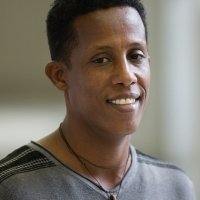Cross-Border Intergroup Conflicts in the Horn of Africa: A Case Study of Ethiopia-South Sudan Borderland People
On November 8, 2017, the Wilson Center Africa Program hosted an event entitled “Cross-Border Intergroup Conflicts in the Horn of Africa: A Case Study of Ethiopia-South Sudan Borderland People,” featuring Mr. Tasew Tafese Gashaw, a doctoral candidate at Addis Ababa University; Dr. E.J. Hogendoorn, the Deputy Program Director for Africa with the International Crisis Group; and Ms. Varalakshmi Vemuru, the Senior Social Development Specialist, Global Practice on Urban, Social, Rural and Resilience at The World Bank Group. This event will explored the relationship between border conflict, resource scarcity, and regional stability, focusing on the Ethiopia-South Sudan border as a case study.
Dr. Hogendoorn opened the discussion by outlining the current dynamics of conflict in the Horn of Africa, emphasizing how long-term historical rivalries continue to play a profound role in the region and have been further complicated by new developments. Beyond historic enmities, and the continuing civil war in South Sudan, conflict has re-emerged between Ethiopia and Eritrea and between Ethiopia and Egypt. The construction of the Grand Renaissance Dam on the Blue Nile has exacerbated tensions between regional states, as the dam will affect the flow of water downstream. The dynamics between the Middle East and the Horn of Africa are becoming increasingly tense and complex, which is another destabilizing force that presents a problem of coordination between regional diplomatic and economic bodies. In the Horn, conflicts do not just exist between states but also within them, rendering traditional diplomatic siloes ineffective. The region as a whole lacks a mechanism for building confidence between states, a gap that creates a larger potential role for international actors in promoting transparency.
Ms. Vemuru offered a perspective on current humanitarian, development, and peacebuilding efforts ongoing in the Horn of Africa, noting shortcomings and room for improvement and growth. She noted that poor governance, environmental degradation, food insecurity, and a lack of economic opportunity are all triggers for populations to move, and lines have increasingly been blurred between voluntary and involuntary migration. Most refugee camps are located in rural, marginalized areas, characterized by an almost total erosion of human capital. The World Bank’s approach to the issue is characterized by an emphasis on inclusive development and building the skills, resources, and resilience of refugees and of host communities. The key takeaways are that forced displacement and migration is a regional phenomenon that requires regional solutions. While short-term humanitarian interventions have been more common than longer-term development, they are unsustainable and have not led to improvements in conditions for refugees or host communities. In addition, gender based violence is a pervasive challenge in the region that has been exacerbated by conflict and insecurity; this issue deserves dedicated attention.
Mr. Gashaw presented a case study of conflict in the Horn of Africa: conflicts between groups on the border between Ethiopia and South Sudan. Violence between borderland peoples is fueled by improper natural resources distribution, the lack of natural resources management, engrained cultural assumptions, and the influence of climate change. Border porousness, weak administration, the flow of illicit arms, and continued instability in South Sudan also contribute. The frequency of attacks, cattle raiding, and child abduction between borderland groups has been increasing in recent years. Although both Ethiopia and South Sudan have acknowledged the problem of border insecurity, their actions and agreements have failed to address the root causes of conflict. Further, South Sudan has been unable to disarm the armed groups due to the ongoing civil war. Both countries have failed to connect disarmament, demobilization, and reintegration with security sector reforms. Stability in South Sudan is a key piece of mitigating borderland conflict, as is empowering and building the capacity of traditional institutions and bolstering borderland security. Government, regional, and international actors must work together to reduce the spread of arms and improve resource management.
The Southern Voices Network for Peacebuilding (SVNP) is a continent-wide network of African policy and research organizations that works with the Africa Program to bring African analyses and perspectives to key issues in U.S.-Africa relations. Funded by the Carnegie Corporation of New York since 2011, the project provides avenues for African researchers to engage with, inform, and exchange perspectives with U.S. and international policymakers in order to develop the most appropriate, cohesive, and inclusive policy frameworks for the issues of peacebuilding and state-building in Africa.
This event was livetweeted and webcast. Follow the Africa Program Twitter account @AfricaUpClose and catch up on the conversation #CrossBorderConflict.
Speakers

PhD Candidate, Addis Ababa University; Institute for Peace and Security Studies
Moderator

Hosted By

Africa Program
The Africa Program works to address the most critical issues facing Africa and US-Africa relations, build mutually beneficial US-Africa relations, and enhance knowledge and understanding about Africa in the United States. The Program achieves its mission through in-depth research and analyses, public discussion, working groups, and briefings that bring together policymakers, practitioners, and subject matter experts to analyze and offer practical options for tackling key challenges in Africa and in US-Africa relations. Read more
